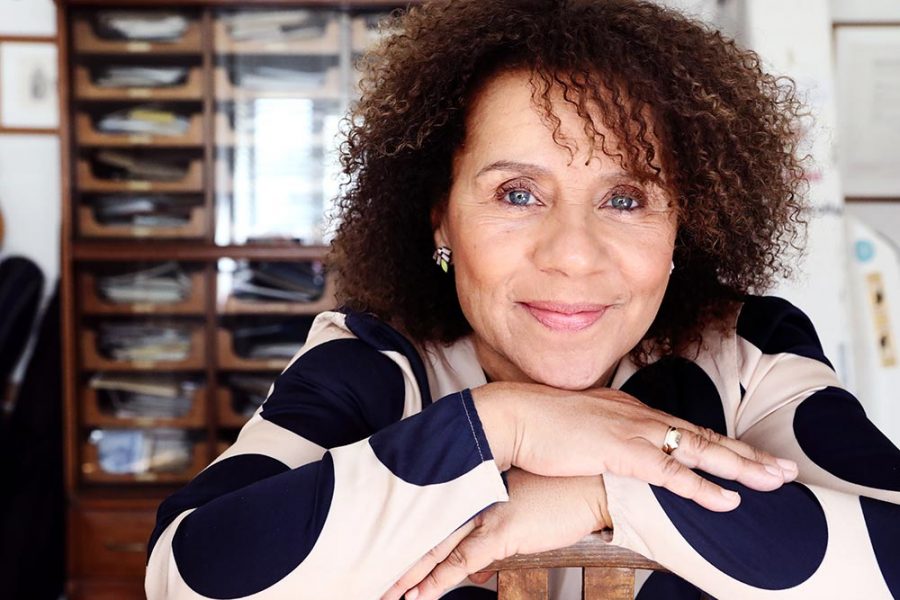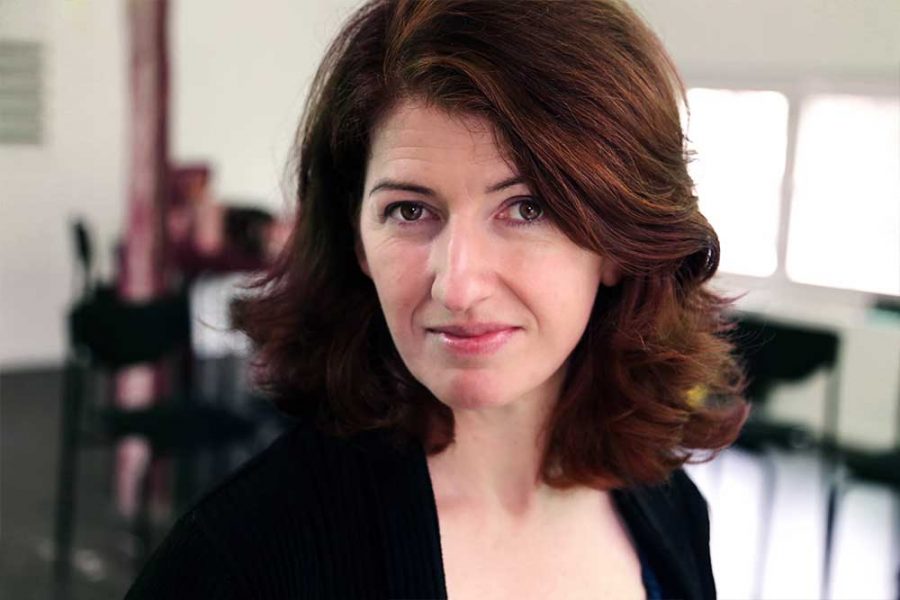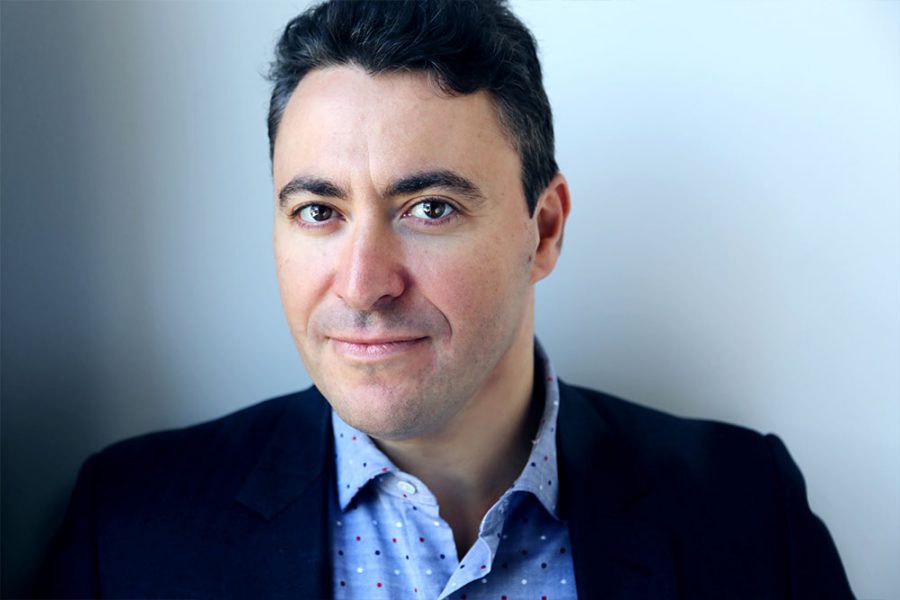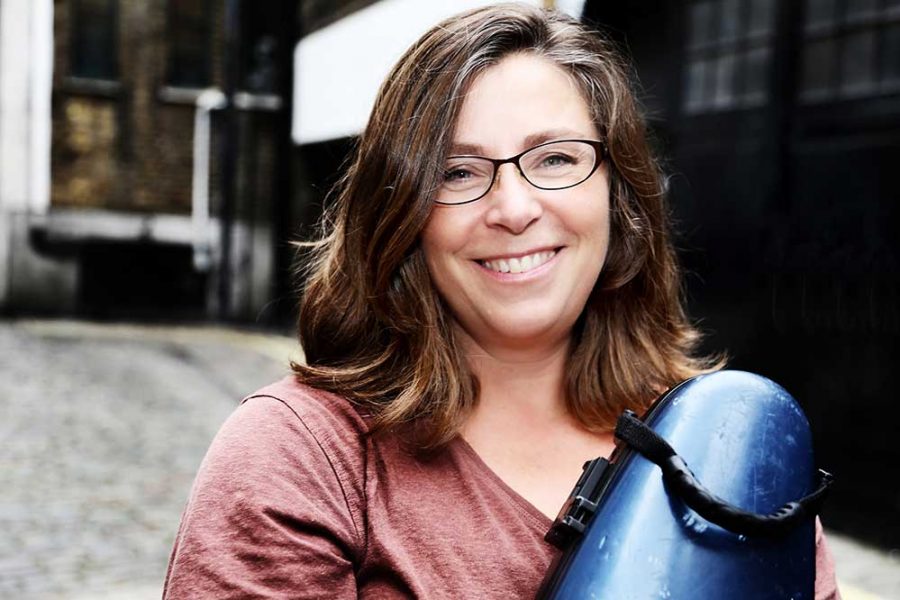Mixing it up: The Chatham Saxophone Quartet

July 2015
Words by
Emer Nestor
Photos by
Frances Marshall
Ireland’s Chamber Music Scene is enjoying the innovative sounds of new kids on the block, the Chatham Saxophone Quartet.
Specialising in contemporary, classical, and jazz genres, this virtuosic group comprises the musical imaginings of Daniel Dunne (Soprano Saxophone), Darren Hatch (Alto Saxophone), Ciaran Sutton (Tenor Saxophone), and Ian Finlay (Baritone Saxophone). Taking its name from the street upon which the members first met, the ensemble has appeared at Boyle Arts Festival, Ten Days in Dublin festival, Galway Music Residency, the National Concert Hall, the Twisted Pepper, Dingle’s Féile na Bealtaine, Iniscealtra Festival of Arts, and Dublin’s Kaleidoscope Night at the Odessa Club.
Final Note caught up with the CSQ to talk about winning Music Network’s ‘Young Musicwide Award’, and the release of their debut album, New Irish Music.
Why did you decide to pursue studies in saxophone?
Ian: I started playing music aged 8 in the local marching band — the Artane Boys Band. It wasn’t until I was 16 that I started to get formal lessons and complete my grade exams through DIT. I decided not to study saxophone in college, choosing to read Economics at Trinity College, Dublin instead. However, I always kept my music standard up to scratch with constant practice and performances. The saxophone is such a versatile instrument, and can keep you very busy if you are willing to dip your toes into various genres. Following my undergraduate studies, I was accepted onto the Masters in Music Performance program at DIT because of my level of professional experience. Unfortunately, I had to defer my place when I got a full time job. So I suppose you could say my pursuit of saxophone studies is a constant struggle.
Dan: I came from a very musical family. My father ran a local Concert Band in Wicklow and everyone was involved — siblings, cousins, aunts and uncles. My mother often joked that music was the religion in our house. I initially started out as a trumpet player, taking lessons from my father, but when I was 12 a space became available in the Royal Irish Academy of Music studying saxophone with Fintan Sutton. I continued to take lessons with Fintan for another ten years right through my undergraduate studies. It was my love of performing in ensembles that motivated my interest in studying the saxophone further, and similarly what attracted me to the idea of the quartet.
Darren: When I was younger I never even considered studying or pursuing it as a career. As I got older it became such a big part of my life that it eventually became the obvious choice when it came time to deciding what I was going to study.
Ciaran: Like a lot of young kids, I started off playing violin and piano (my Mum being a violin and piano player). I went down the standard route of grades and orchestras until I was about 10 or 11, when I took up the clarinet. My Dad is a clarinet and saxophone player with the National Symphony Orchestra, so it was a sound I had always grown up with and enjoyed listening to, albeit in the background. I got lessons from my Dad during my teenage years, again solely focusing on classical clarinet playing, doing grades and playing in orchestras. While in college studying science, I kept part-time lessons going with Paul Roe in the RIAM. It was only towards the latter end of my science degree that I took up the sax. Initially, I took up the instrument more out of necessity for playing in musicals and jazz bands etc…, but in time I began to focus more on it. My degree course was quite busy with a lot of course hours, so it wasn’t until I finished my degree and started a PhD in Geology that I had the time to really focus on the sax.
What drew you all to DIT Conservatory of Music and Drama?
Ian: It was the father and son team of Tim and Kevin Hanafin that drew me to DIT. Tim is now retired, but I regard Kevin as the best classical saxophone educator in the country, as well as a being simply a lovely guy.
Dan: I undertook a degree in Music Education run jointly by Trinity College, Dublin and DIT Conservatory of Music and Drama. I continued to keep my saxophone lessons in the RIAM at this time, but I performed with DIT ensembles such as the wind band, jazz band and orchestra. I was given some great opportunities while I was studying at DIT including two concerto performances. Following my degree, I continued my studies with a Masters in Performance (studying saxophone) with Kevin Hanafin in DIT.
Darren: DIT was recommended to me by my teacher at the time, as both he and the previous one had studied there.
Ciaran: Up until now I had really been playing the sax in exactly the same way that I had been playing the clarinet. Although quite similar, there are definite different techniques required in approaching these two wind instruments. In order to really improve on the sax and learn some proper technique, I decided to enroll part-time in DIT for a year with Kevin Hanafin, while working on my PhD. The great thing about the PhD is that it gave me the flexibility to practice and get involved with various ensembles. One such ensemble was the CSQ. I had played with the other guys in different groups before, but not in a quartet setting. Joining this group encouraged my drive to improve on the sax. The other lads in the quartet had a lot more years of sax playing behind them, with the sax being their main instrument. Therefore, I strived to get my sax playing to a high level, to compliment the other players in the quartet…I’m still working on that!
How did the Chatham Saxophone Quartet come to be?
The CSQ came about when Dan, Darren and two other full time DIT saxophone students wanted a more interesting creative outlet back in 2008. Ciaran joined the quartet a couple of years later when a member left, and Ian followed suit in 2011 to make up the quartet as you see it today.
What does each member bring to the ensemble?
We all come from very different musical backgrounds and have lots of different ideas and suggestions when it comes to chamber music and ensemble playing. Dan’s background as a music teacher and amazing multi-instrumentalist means he often runs the show (although we all have our moments!). Ian has a bit of a background in jazz and improvised music, so he often has things to say about the ‘swing’, ‘groove’ or ‘feel’ of the quartet. Ciaran, being a clarinetist originally, has better insight into the classical works we perform. Darren is the ‘quiet man’ of the group, not just in the amount he says, but also his ridiculous dynamic range on the saxophone — you’d need super human hearing to hear his pianissimos! But when Darren speaks, we all listen!

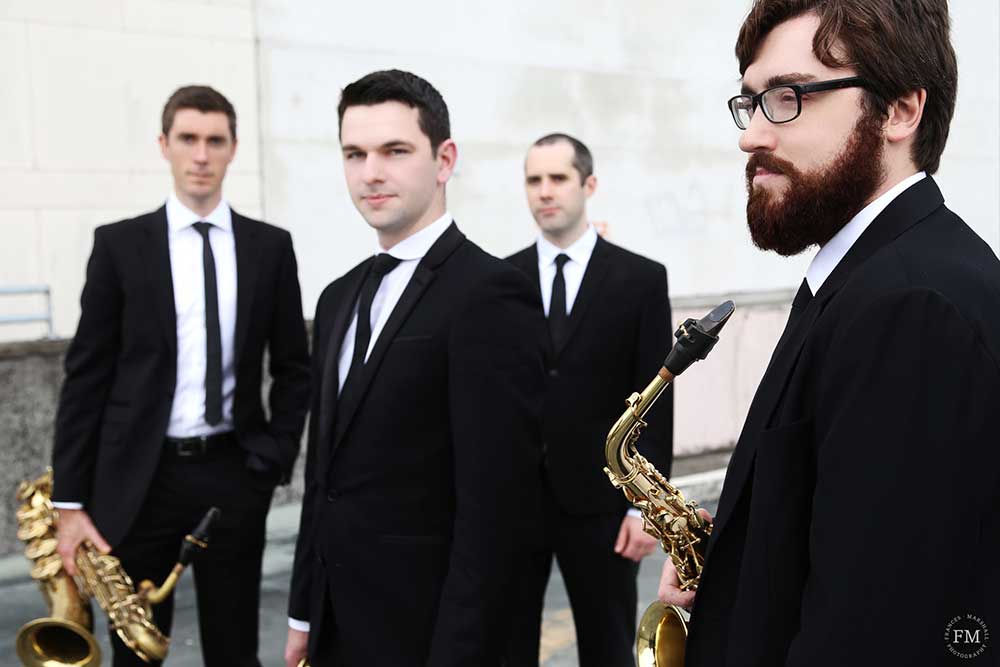


...we really benefit a lot from studying string quartet versions and doing our best to replicate many of the elements...while still bringing out our own personality as a quartet."

From where do you each derive your inspiration?
Ian: I get my inspiration from my amazing friends and family. They’re always full of suggestions for new pieces, or new musical directions. I love being introduced to new ideas or shown new works and bands by people. It makes me happy seeing or hearing these new things.
Dan: I am a secondary school music teacher in Belvedere College Dublin, and I can safely say the majority of my inspiration is derived from the energy of my students. As part of my position, I am the director of the school’s instrumental and band programme, which involves approximately 200 students. They keep me on my toes and their appetite for learning really drives me on. As a quartet, we have been very fortunate to undertake coaching and master classes with some phenomenal ensembles, including the Vanbrugh Quartet, the ConTempo Quartet and the Amstel Quartet, all of whom have been inspirational to work with.
Darren: Mostly from the other musicians and artists that I am very fortunate to work with.
Ciaran: From a musical point of view, I draw inspiration from listening to other players from a variety of different cultures. These days, you can really listen to any type of music online. As such, there is a wealth of musicians to listen to out there. I often find myself losing (well not losing, definitely gaining in this case!) hours on YouTube listening to different players from all around the globe…and not just sax players. As an ensemble, I think we are constantly driving each other forward with different thoughts and ideas, and I would feel that among other things, we inspire each other.
Aside from the obvious, what are the technical and interpretative challenges of transforming the string quartet repertoire into this medium?
We find that the string quartet repertoire transfers quite neatly into the realm of the saxophone quartet. In the simplest sense, the ranges are all quite similar for the various instruments, so the transcriptions take very little tweaking. There are some obvious technical difficulties…like the fact that some violin parts go so high that it would be near impossible to replicate on a soprano saxophone. We also can’t do certain string-specific techniques, like double stops, tremolos and pizzicato, although we do our best to replicate them. I think the main problem we often face is the interpretation of the music. We wouldn’t be nearly as well versed in the classical repertoire as a full time string quartet, so when performing transcriptions of older classical works, we really benefit a lot from studying string quartet versions and doing our best to replicate many of the elements…while still bringing out our own personality as a quartet.
What elements determine which string pieces are chosen for transcription?
Often it’s as simple as one of us hearing a piece, liking it and thinking it will work for the saxophone quartet, and bringing the idea to the group. Once there are no huge technical barriers, it usually works out fine.
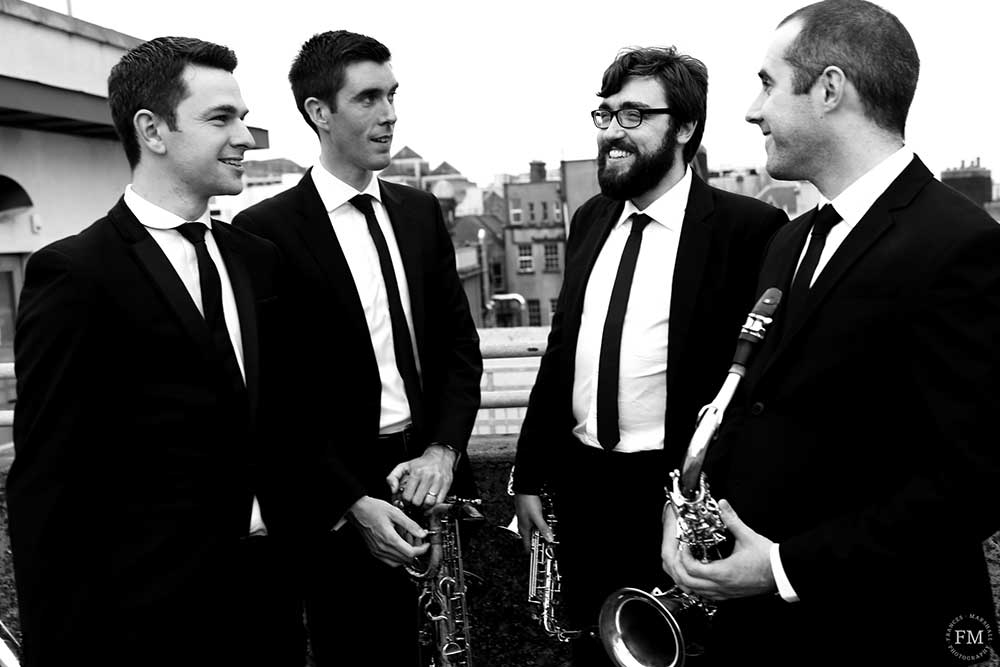


Are audiences and musicians reacting well to your work?
Yes! People seem to really enjoy our live performances in particular. We’re well aware that sitting through an hour and a half’s worth of any chamber music can be pretty challenging unless there’s some variety thrown in there. So our live concerts feature a mix of classical transcriptions, brand new contemporary works, minimalist twentieth century music, as well as multimedia pieces involving backing tracks and live visuals. We also make a point of chatting to the audience, and introducing and explaining every piece on the programme. It makes the whole thing more interesting for both the audience and the quartet. Regarding the album, the reaction has been fantastic. We’re very proud to say that every part of it, from the compositions to the cover art to the producers, engineers and performers — it’s all completely new and Irish made.
How did winning Music Network’s ‘Young Musicwide Award’ (2012) enhance the development of the quartet?
Before getting involved with Music Network, we wouldn’t really have considered ourselves a very ‘professional’ group. But the ‘Young Musicwide Award’ gave us the support and confidence to achieve things we could only have dreamed of. Since winning the award we’ve had a piece written for us by a Golden Globe nominated composer (Brian Byrne), we’re had a nationwide tour of our live show, and we’ve just released this amazing album. It was on the back of this confidence that we approached lyric fm with the half-completed album, and they were very interested in backing and supporting, what they viewed as a worthwhile project. Our album is officially on the RTÉ lyric fm label, and available in music stores throughout Europe.
Tell us about your collaborations with Irish composers, and the inspiration behind your latest album New Irish Music.
We’ve always enjoyed playing works by Irish composers. When Music Network told us that part of the ‘Young Musicwide Award’ was funding for a commission, we immediately approached Brian Byrne. He thankfully agreed to take the project on, and the first track on the album is his Saxophone Quartet No. 1. It was this venture that sparked the idea of approaching more Irish composers and creating an album based completely on their works. Thankfully, all the composers we contacted were more than happy to contribute to the project, and we’re incredibly proud of the final result.
Is there an ultimate goal?
The only goals for us are to keep improving as an ensemble, and continue making interesting music that people want to hear.
What does the rest of 2015 hold for the ensemble?
At the moment we’re working on developing a new live show, and are working with young Irish composers, Brendan Breslin and Amanda Feery.
For more information on the CSQ see: www.chathamsaxquartet.ie
All images displayed in this article are subject to copyright.
Share this article


